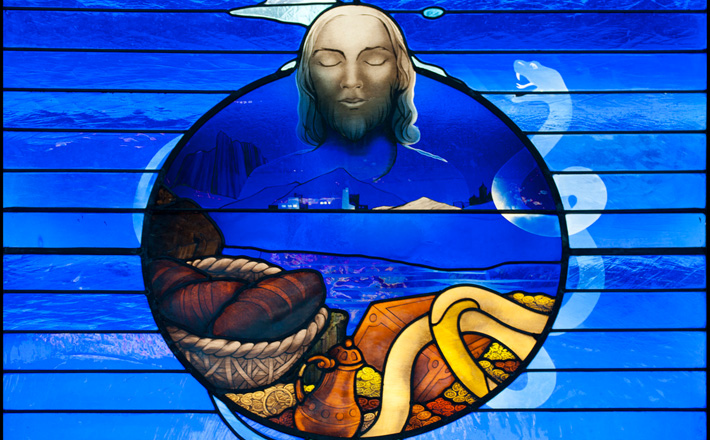Commentary on Romans 5:12-19
In Adam’s story Paul hears how sin gained dominion over humanity.
The paradox that Paul maintains is that although we can’t escape sin since we are connected to Adam (“sin came into the world through one man,” verse 12a), we are also each our own Adam or Eve, very willingly turning away from God (“because all have sinned,” verse 12b). Thus, we are responsible for our sinning, even if we aren’t able to stop it.
We’re stuck under sin’s tyranny. The result is the reign of death, sin’s ally, over us. However, Adam’s act of disobedience has been overcome by the more powerful obedience of Jesus (his faithful death on the cross). Just as we once had our identity and our deadly destiny in Adam, so now we have a new identity and a new destiny of righteousness and life in Christ.
As we consider this text, two issues in particular demand our careful attention. The first arises from our own cultural context, and the second from the wording of the text itself. First, we need to be thoughtful in how we talk about Adam and death in the context of our understanding of the evolutionary world.
In the past 200 years, we have learned that for billions of years before any humans or their sin were present, the world’s evolving life was built upon death and extinction. No naïve-sounding talk about Adam as a historical individual will suffice in our context. Augustine complained about preachers in his day who did not take seriously enough the astronomical science of the time. Augustine said that, in doing so, not only where they careless with the truth about God’s world, but that they also appeared to be ignorant and thus brought unnecessary ridicule and rejection of the gospel. We out to be careful not to repeat that error by how we speak about Adam and death.
The Genesis story of Adam and Eve is a theological metaphor describing what it means to belong to a humanity in broken relationship with God and with the rest of the world. The gospel of Christ does not depend on a literal “first couple,” or on the absurd claim that there was no death in the world before humans and their sin. It isn’t only an awareness of the billions of years of life’s evolution that points this out to us.
Throughout the Old Testament, “to be created is to be finite and mortal. Such limitation is not evil but simply the condition of being a creature.”1 Perhaps theology’s traditional use of Romans 5 to make all the world’s death hinge on human sin is far too self-centered (even idolatrous), and in the end has tended to remove creation itself from our thinking about God’s saving mercy (and so also from our own care).
What do we do, then, with Paul’s use of the Genesis narrative here in Romans 5? Even though unable to affirm with Paul a historical Adam or that death begins with human sin, we know all too clearly that human sin does in fact bring death — non-evolutionary, unproductive, alienating death — into the lives of our neighbors, ourselves, and the rest of creation. Even if we can’t assume with Paul an individual Adam, we can still affirm that sin is rooted in each of us (if not by Adam, then by the self-serving evolutionary instincts that we joyfully indulge), and that we all engage in the intertwined reality of sin and death.
Paul claims that God has reversed and remedied this situation through Christ. Our affirmation of that claim does not depend on either Adam or “the Fall” as historical events. What God intends for creation and for humanity is seen not in an “original” deathless paradise, but in Christ himself. In his death and resurrection, we see that God intends and promises freedom from death, even though death was part of this world from the beginning.
Salvation is not simply a return to some paradisaical origin, but a healing of God’s beloved creation so that it attains its final goal in Christ. Perhaps the perspective afforded to us by Darwin’s insights can help us to hear and proclaim the depth of that healing. In Christ, God has begun the new creation and the end of our alienation from the Source of all life.
The second issue raised by this text which deserves our attention is how Paul does not allow the healing brought by Jesus to be smaller than the reality of sin and death. Instead, God’s life-giving grace “abounded all the more” (verse 20). The parallelism in verse 18 is precise and insistent; both the past effect of Adam’s sin, and the present / future effect of Jesus’ righteousness, are said to be “for all.”
Failing to read the “all” as equally inclusive in both halves of this verse would destroy the power of Paul’s argument. However, Paul is not claiming a simple balance between Adam and Christ. Rather, in Christ, God has overcome the effects of Adam’s sin. Paul says that the life and justification which come through Jesus encompass all the world. We should be careful not to blunt that claim with any of our caveats or conditions.
Our own questions about “universal salvation,” however, may not have been uppermost on Paul’s mind. Paul’s primary concern in this text is to show that salvation is only “in Christ.” God through Christ has decisively altered the reality of all the world, and no one can escape that.
You cannot remove yourself from the world in which God has acted through Christ. You can ignore it, you can despise it, but you can’t change it. Paul assumes that people make decisions and that they are held responsible for those. But you cannot avoid being part of the world which God created and which now God has decided to redeem in Christ. That good news is deeper than sin and death.
Notes:
1 Elizabeth A. Johnson, Ask the Beasts. Darwin and the God of Love (Bloomsbury, 2014), 219.


March 5, 2017